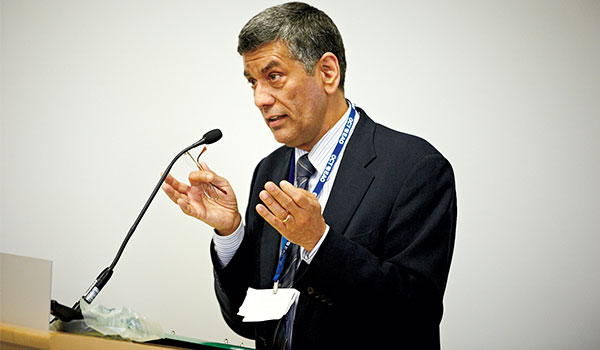Governing Ourselves informs members of legal and regulatory matters affecting the profession. This section provides updates on licensing and qualification requirements, notification of Council resolutions and reports from various Council committees, including reports on accreditation and discipline matters.
annual meeting of members

Raj Anand spoke at the annual meeting of members.
FRESH CHALLENGES
The challenge of maintaining public confidence in self-regulation is faced by every profession in Ontario, throughout Canada and around the world, says Raj Anand, a former Chief Commissioner of the Ontario Human Rights Commission and the keynote speaker at the Ontario College of Teachers’ 2013 annual meeting of members, who spoke about accountability, transparency and professional ethics on June 6 at the College.
“But the teaching profession faces a particularly delicate balance, in part because of the position of teachers compared to the position of most professionals,” he says.
“While teachers are not the only profession in Ontario whose livelihoods are tied closely to fiscal constraints and the public budget, and whose economic welfare is therefore primarily dependent on tax dollars, they are certainly more visible than most. High union density and a unique province-wide collective bargaining structure involving provincial discussion tables accentuate the visibility of teachers’ economic welfare demands.”
Anand is a lawyer, arbitrator and mediator with WeirFoulds LLP, and a member of the board of directors of the Law Society of Upper Canada. His practice includes administrative, human rights, constitutional and employment law, civil litigation, professional negligence and discipline.
However, he feels comfortable among members of the teaching profession. He comes from a family of teachers, including his wife, mother and two siblings. He recently finished a term at Osgoode Hall Law School as a visiting fellow, teaching legal ethics and professionalism.
“Both the legal profession and the teaching profession have faced continuing changes in what is expected from regulators,” he says.
For example, he notes that the development of an access-to-information culture and the Internet have changed expectations about what the public should and can access about the professions.
Self-regulating professions face perennial tasks such as “how to serve the ‘public interest’ when the concept of ‘the public interest’ is necessarily malleable and contested.”
The reality of professional regulation, particularly with respect to teaching, he says, “is that there is an array of stakeholders — the state, parents, students, teachers, teachers’ unions, administrators, the regulator itself, taxpayers, the business community, other professions, other employees, other unions, the postsecondary education sector — all with their own interests and conception of what constitutes the public interest.”
During the annual meeting, Council Chair Liz Papadopoulos, OCT, reported on Council’s activities during the last year, and Registrar Michael Salvatori, OCT, discussed the College’s 2012–13 initiatives.
